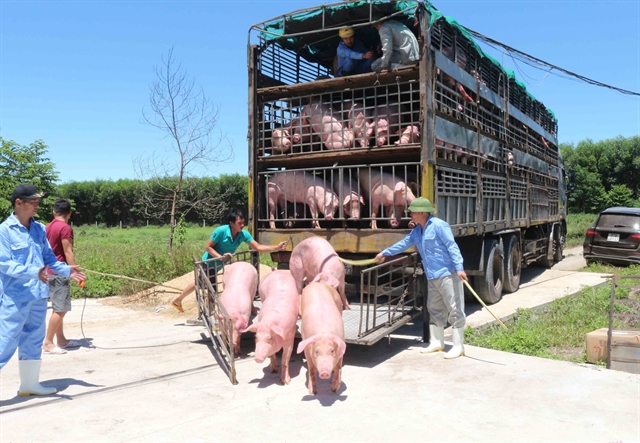The Ministry of Agriculture and Rural Development sent a document to the Thai Embassy in Ha Noi on Friday to temporarily suspend the import of live pigs for slaughter from Thailand into Viet Nam from June 30.

The Ministry of Agriculture and Rural Development sent a document to the Thai Embassy in Ha Noi on Friday to temporarily suspend the import of live pigs for slaughter from Thailand into Viet Nam from June 30.
The move was made in order to prevent African swine fever from entering Viet Nam and spreading the disease to domestic pig herds.
For batches of live pigs that have been signed by enterprises of the two countries and will be transported to Viet Nam by June 29, the Ministry allowed imports into Viet Nam and directed the veterinary agency to strictly control them to ensure food hygiene and safety.
The Ministry of Agriculture and Rural Development assigned the Department of Animal Health to co-ordinate with the authorities of Thailand to assess the disease situation in Thai pigs raised for slaughter, and consider allowing importation when conditions on disease safety are ensured.
The quarantine agency under the Department of Animal Health detected 980 pigs imported from Thailand to Viet Nam infected with African swine fever on May 19.
Previously, due to a serious shortage of domestic supply, causing the price of pork in Viet Nam to rise, Deputy Minister of Agriculture and Rural Development Phung Duc Tien signed a document allowing live pigs from Thailand to be imported into Viet Nam for slaughter for food or farming in June last year.
The country imported nearly 226,000 tonnes of pork of all kinds last year, an increase of 260 per cent compared to that of 2019. The main sources of imports are from Russia, Poland, Brazil, Canada, the US, Germany, and Spain.
As for the import of live pigs from Thailand, statistics from the Department of Animal Health showed that more than 503,000 pigs were imported to Viet Nam from mid-June last year to January 13 this year.
In the first quarter of 2021, The country imported 34,600 tonnes of pork (HS code 0203), worth US$80.07 million, up 101.4 per cent in volume and 102.3 per cent in value over the same period last year. — VNS





